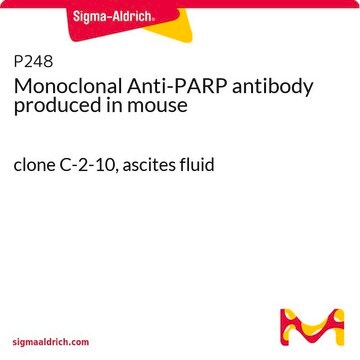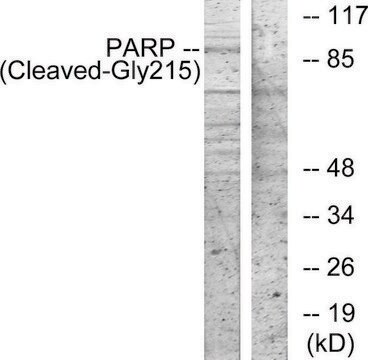SAB4500487
Anti-PARP (Cleaved-Asp214) antibody produced in rabbit
affinity isolated antibody
Sinónimos:
ADP-ribosyltransferase 1, ADPRT, ADPRT1, PARP, pADPRT-1
About This Item
Productos recomendados
biological source
rabbit
Quality Level
conjugate
unconjugated
antibody form
affinity isolated antibody
antibody product type
primary antibodies
clone
polyclonal
form
buffered aqueous solution
mol wt
antigen 24 kDa
species reactivity
mouse, human
concentration
~1 mg/mL
technique(s)
ELISA: 1:20000
western blot: 1:500-1:1000
NCBI accession no.
UniProt accession no.
shipped in
wet ice
storage temp.
−20°C
target post-translational modification
proteolytically cleaved (Asp214)
Gene Information
human ... PARP1(142)
General description
Immunogen
Immunogen Range: 165-214
Application
Biochem/physiol Actions
Features and Benefits
Physical form
Disclaimer
¿No encuentra el producto adecuado?
Pruebe nuestro Herramienta de selección de productos.
Storage Class
10 - Combustible liquids
wgk_germany
nwg
flash_point_f
Not applicable
flash_point_c
Not applicable
Certificados de análisis (COA)
Busque Certificados de análisis (COA) introduciendo el número de lote del producto. Los números de lote se encuentran en la etiqueta del producto después de las palabras «Lot» o «Batch»
¿Ya tiene este producto?
Encuentre la documentación para los productos que ha comprado recientemente en la Biblioteca de documentos.
Nuestro equipo de científicos tiene experiencia en todas las áreas de investigación: Ciencias de la vida, Ciencia de los materiales, Síntesis química, Cromatografía, Analítica y muchas otras.
Póngase en contacto con el Servicio técnico








